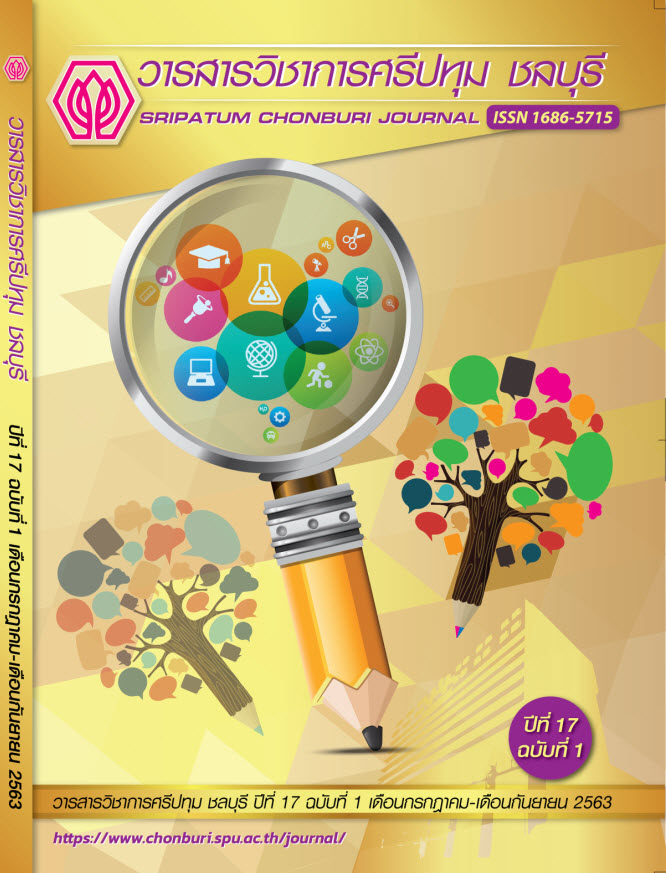PSYCHOLOGICAL FACTORS THAT AFFECT STUDENT ACHIEVEMENT SECONDARY LEVEL, SUAN ANAN SCHOOL
Keywords:
academic achievement (GPA), IQ, CQ, EQ, SQ, AQ, MQ, Suan Anan School.Abstract
The objectives of this research were to examine the relationship between academic achievement and IQ, CQ, EQ, SQ, AQ and MQ scores of secondary school students, analyze the psychological factors that affect students’ GPA and expect for predictions, and investigate the quality variables that make students successful in their studies. The method was a quantitative and qualitative study. The population was the 349 secondary school students of Suan Anan School in the second semester of the academic year 2016. The sample number was 157 students, randomly mathayom 1, 2, 3, 4, 5 and 6. Number 30, 36, 37, 31, 12 and 11 people were in stratified unequal proportions. Tools have six sets: 1) IQ test, 2) CQ test, 3) EQ test, 4) SQ test, 5) AQ test, and 6) MQ test. Moreover, there were set a focus group to study qualitative variables that make students successful in their studies. In the first and second semester, the results showed that GPA was related to IQ, EQ, and AQ. In the first semester, the factors that predicted were IQ and the second semester, The factors that predicted were IQ and AQ. In the qualitative study, it was found that success in learning consists of IQ, AQ, active learning methods, setting up a clinic to treat students who did not understand mathematics and science, and pay more attention to studying in class.
References
กิ่งแก้ว ทรัพย์พระวงศ์. (2551). ความคิดสร้างสรรค์และความสามารถในการเอาชนะอุปสรรคของนิสิตนักศึกษาระดับปริญญาตรี. วารสาร BU Academic Review, 7(2),
หน้า 9-21.
ปฐมา อาแว, มนสิการ เปรมปราชญ์ และพิศมัย เพียรเจริญ. (2553). รายงานการวิจัย: การศึกษาความสัมพันธ์ระหว่างผลสัมฤทธิ์ทางการเรียนระดับมัธยมศึกษาตอนปลาย
ผลการสอบคัดเลือกเข้ามหาวิทยาลัยและผลการเรียนระดับมหาวิทยาลัย กับผลสัมฤทธิ์ทางการเรียนของบัณฑิต มหาวิทยาลัยสงขลานครินทร์ วิทยาเขตปัตตานี ปีการศึกษา
2546-2550. ปัตตานี: มหาวิทยาลัยสงขลานครินทร์ วิทยาเขตปัตตานี.
ภูมิบดินทร์ หัตถนิรันดร์. (2547). ความสัมพันธ์ระหว่างเชาวน์ปัญญา (IQ) ความฉลาดทางอารมณ์ (EQ) ความสามารถในการแก้ไขปัญหาและฝ่าฟันอุปสรรค (AQ)
และเชาว์ปัญญาด้านจริยธรรม (MQ) กับผลสัมฤทธิ์ทางการเรียนวิชาคณิตศาสตร์ชั้นมัธยมศึกษาปีที่ 1. วิทยานิพนธ์การศึกษา มหาบัณฑิต สาขาวิชาการวัดผลการศึกษา,
บัณฑิตวิทยาลัย มหาวิทยาลัยมหาสารคาม.
มณีรัตน์ กรุงแสนเมือง. (2549). การทำนายผลสัมฤทธิ์ทางการเรียนของนิสิตจุฬาลงกรณ์มหาวิทยาลัยที่ผ่านการคัดเลือกบุคคลเข้าศึกษาในระบบกลางการรับนิสิตนักศึกษา.
วิทยานิพนธ์ครุศาสตรมหาบัณฑิต สาขาวิชาวิจัยการศึกษา, บัณฑิตวิทยาลัย จุฬาลงกรณ์มหาวิทยาลัย.
รวีวรรณ งามสันติกุล. (2558). การทำนายผลสัมฤทธิ์ทางการเรียนของนิสิตระดับปริญญาตรี ภาควิชาคณิตศาสตร์ คณะวิทยาศาสตร์ มหาวิทยาลัยศรีนครินทรวิโรฒ ที่ผ่านการ
คัดเลือกเข้าศึกษาแบบสอบตรง. วารสารหน่วยวิจัยวิทยาศาสตร์ เทคโนโลยี และสิ่งแวดล้อมเพื่อการเรียนรู้, 6(2), หน้า 127-140.
สถาบันราชานุกูล. (2557). เด็กเรียนรู้ช้า คู่มือสำหรับพ่อแม่/ผู้ปกครอง (พิมพ์ครั้งที่ 3). กรุงเทพฯ: โรงพิมพ์ชุมนุมสหกรณ์การเกษตรแห่งประเทศไทย.
Jellen, Hans G., & Urban, Klaus K. (1986). Test for creative thinking drawing production. The Creative Child and Adult Quarterly, 11(8), pp. 107-155.
Raven, John C. (1938). Standardization of progressive matrices. British Journal of Medical Psychology, 19(1), pp. 37-150.
Yamane, Taro. (1973). Statistics: An introductory analysis (3rd ed.). New York, NY: Harper and Row.
Downloads
Published
Issue
Section
License
บทความทุกบทความเป็นลิขสิทธิ์ของวารสารวิชาการศรีปทุม ชลบุรี



